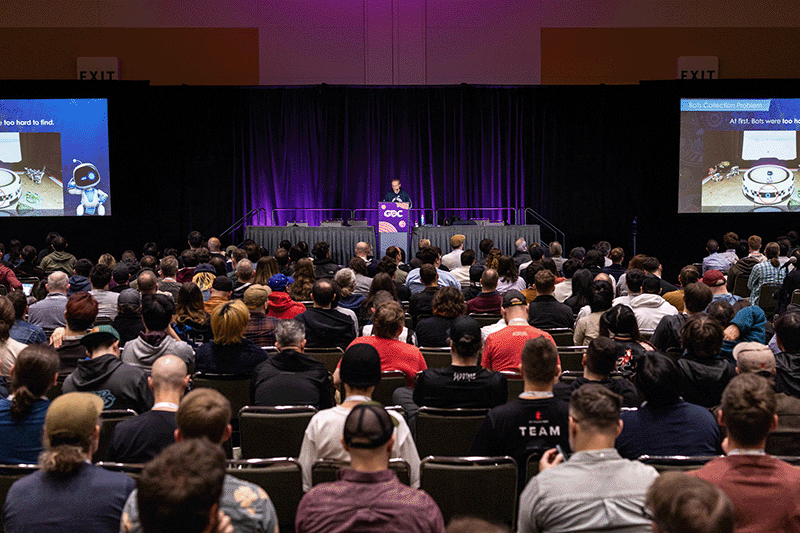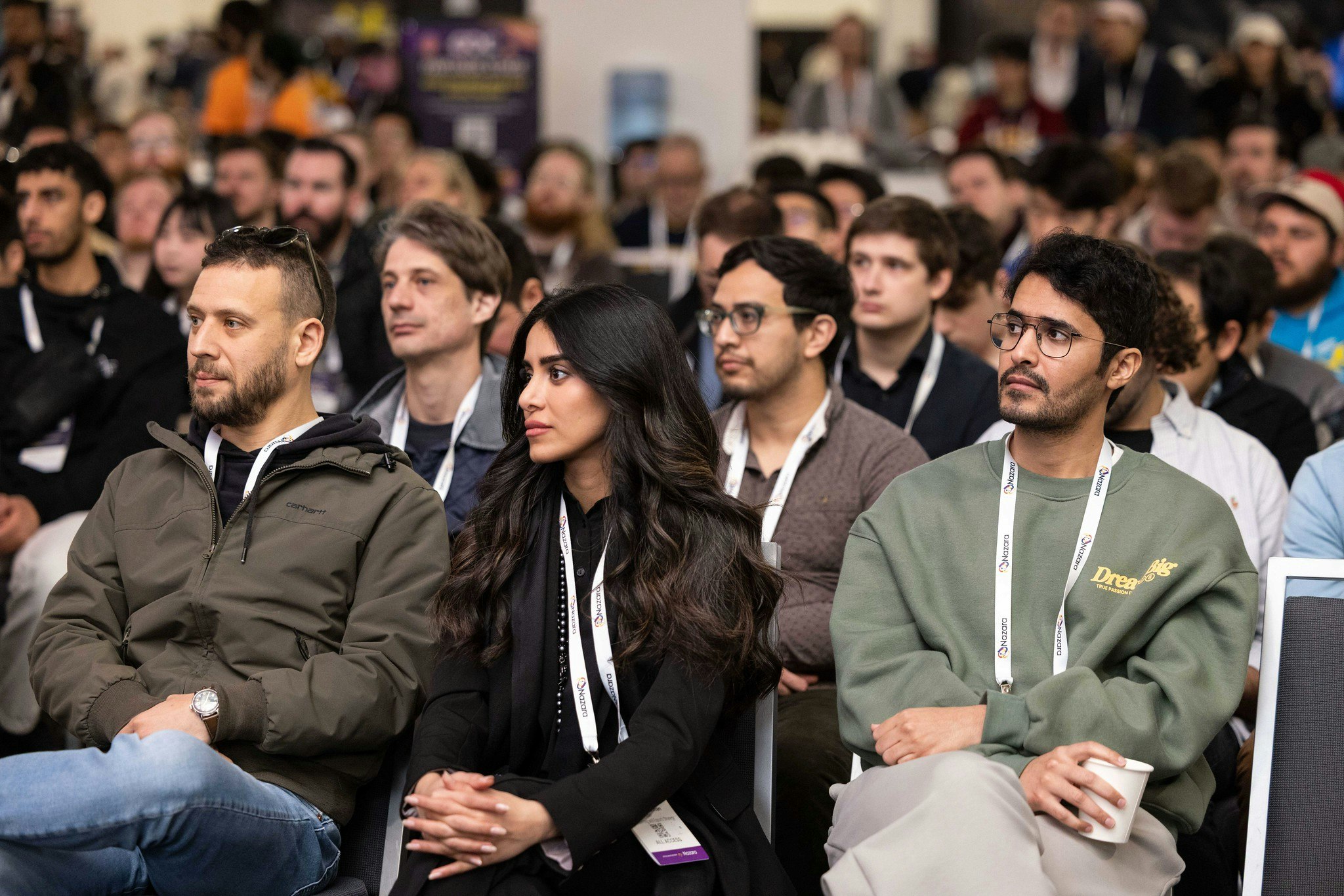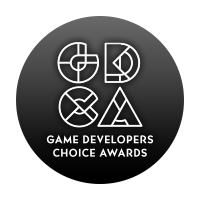GDC Call for Submissions
Call for Submissions is Closed
Deadline: August 7, 2025 at 11:59pm PT
This Isn’t Just a New Year. It’s a New GDC.
GDC is transforming. The 2026 program has been refreshed with new formats, a unified structure, and a stronger focus on the full gaming ecosystem.
We’re shifting from a purely technical, classroom-style conference into something more dynamic, more connected, and more reflective of how the industry really works. GDC 2026 brings everyone – developers, publishers, investors, educators, marketers, executives, and more – into the same conversation.
This is your opportunity to shape that conversation. Whether you’re sharing hard-won lessons, bold insights, or hands-on practices, this year’s GDC is designed to connect speakers and attendees in deeper, more meaningful ways.

What We’re Looking For
Sessions in 2026 will be more interactive, more engaging, and more connected. We’re actively encouraging formats that go beyond the lecture, creating space for real exchange between speakers and attendees, peer discussion, and cross-disciplinary collaboration.
We’re looking for sessions that:
Reflect the broader game development ecosystem
Support connection across job functions and lifecycle stages
Offer clear, actionable takeaways
Encourage meaningful discussion or post-session interaction
Not every presentation has to be delivered from behind a podium. Whether it be a postmortem, case study, market insight, learning module, or interactive/discussion-led session, we welcome proposals in a range of formats:
- Lectures: 30-minute or 60-minute deep-dive presentation. Up to 2 speakers.
- Panels: 60-minute structured discussion. Up to 5 speakers.
- Debates: 60-minute moderated discourse. Up to 5 speakers.
- Microtalks: 30-minute or 60-minute rapid-fire mini-lectures connected by an overarching theme. Up to 5 speakers (30-minute) or 10 speakers (60-minute).
- Roundtables: 60-minute tightly structured, moderated peer discussion. Up to 2 moderators.
- Workshops: full or half-day, interactive and hands-on learning.
- Other: Don’t see a format that fits your proposal? No problem! You can now propose a new format that best delivers your vision at the intersection of learning and connection.
We want sessions that fit the message and give people the chance to connect, not just consume.
Top-rated Examples
Check out Robin-Yann Storm's GDC Submission Advice and view session examples below:



Games Ecosystem and Lifecycle
Sustaining a healthy, successful games industry relies on a collective, coordinated effort across stakeholders in the games industry ecosystem to drive projects through stages of the development lifecycle.
GDC is actively seeking proposals from industry experts within the games ecosystem who contribute to a game’s success, including publishers, developers, technology & service providers, and distribution platforms.
Submissions will be expected to demonstrate effective strategy or execution in one or across multiple key stages of the game lifecycle:
Ideation & Prototyping
The foundational phase of game development that combines creative conceptualization with practical testing. It encompasses the creative process of generating, developing, and communicating new ideas while simultaneously creating simplified working models to test these concepts, mechanics, and assumptions before committing significant resources to full development.
Pitching & Funding
A critical juncture in game development where creators transform their validated concepts into financially viable projects by securing the necessary resources to bring their vision to life. The pitching and funding stage ultimately bridges the gap between creative concept and full production, providing the financial foundation necessary to transform promising prototypes into completed games.
Production & Development
The core phase of game creation where the approved concept transforms into a playable product through systematic implementation of design, code, art, audio, and other game elements. This intensive period represents the largest portion of the game development lifecycle, where multiple specialized teams work in parallel to build and integrate all components according to the established vision and specifications. The production and development stage requires careful orchestration of creative and technical processes, transforming abstract concepts into concrete gameplay experiences through systematic implementation and refinement of all game elements.
Launch
The momentous phase where a completed product transitions from development to public release. This pivotal moment represents the culmination of the development process and the beginning of a game's commercial lifecycle, requiring meticulous planning and execution to ensure a successful debut in the marketplace. A successful launch combines technical readiness, marketing momentum, including discoverability, and community engagement to create a strong entry into the marketplace, positioning the game for sustainable success in an increasingly competitive industry.
Monetization
A strategic component of game development focused on implementing and optimizing revenue generation mechanisms that sustain the game's ongoing operations while balancing business objectives with player experience. This phase spans from initial planning through post-launch optimization, evolving throughout the game's lifecycle to maintain financial viability.
Player Engagement
The omnipresent phase in game development focused on designing, implementing, and optimizing elements that capture and maintain player interest, foster emotional investment, and encourage long-term participation in the gaming experience to establish a thriving community of players. This stage spans the entire development lifecycle but takes on particular importance during post-launch operations, especially within live service models. Through continuous content updates, seasonal events, battle passes, and community-driven features, live service frameworks transform player engagement from a static goal into an evolving conversation between developers and their audience, creating sustainable ecosystems where engagement metrics directly inform ongoing development priorities and content roadmaps.
Who Are You Talking To?
Help us understand your perspective and who you’re trying to connect with. Are you a composer speaking to producers? A publisher presenting to indies? A designer with insights for engineers?
Clearly define:
Your role
Your target audience
What you want them to take away
The stronger the connection, the stronger the session.

Topic Categories
Submissions may cover a range of topics, including but not limited to:
Advocacy: Accessibility, sustainability, DEI, workplace culture, community impact
Audio: Music composition, sound design, VO direction, implementation, spatial audio
Business Strategy: Monetization models, revenue streams, go-to-market strategy, market trends, IP management
Career: Career growth, portfolio development, mentorship, leadership, team dynamics, student and educator/mentor support
Community Management: Player engagement, community safety, creator/influencer ecosystems, social channels, esports
Design: Game direction, creative leadership, gameplay systems, combat design, UX, narrative systems, in-game economies, level design, tabletop
Education: Curriculum design, teaching strategies, pipeline readiness, student development
Funding & Pitching: Publisher/investor relations, crowdfunding, pitch prep, deal structure, negotiation
Independent Games: Sustainable leadership, team scaling, solo development, market entry, creative risk-taking, early access, legal considerations, porting across multiple platforms
Live Service: Product operations, quality assurance, GaaS, retention, roadmap planning
Marketing: Discovery, brand campaigns, user acquisition, performance marketing, influencer partnerships, lifecycle marketing
Production & Team Leadership: Cross-discipline workflows, studio operations, product and pipeline management, scheduling, team culture
Programming: Rendering, systems engineering, AI, Machine Learning, performance optimization, tools and automation, game and visual technologies
Visual Arts: Animation, art direction, concepting, environment creation, VFX, lighting, shaders, pipelines, real-time tools
Review & Selection Process
All submissions are reviewed by GDC Show Management and Advisory Board. Selection criteria are based on proposal concept, depth, organization, credentials and takeaway.
Submissions selected by the GDC Advisory Board can expect to follow a Phase 2 Conditional Acceptance process through which a GDC Advisor connects with the speaker(s) to further develop session content and refine speaker delivery prior to final acceptance into the official program.
Submission and Acceptance Timeline:
Phase 1
- Submissions accepted July 7-August 7, 2025 at 11:59pm PT
- Review and deliberation August 7-September 14, 2025
- Submission status determined (Accepted, Phase 2 Conditional Acceptance, Declined, Pending Information) late September, 2025
Phase 2
- Conditional acceptance advisor-speaker mentorship and content refinement late September – mid-October, 2025
- Conditional acceptance status update (Accepted, Declined, Extended) mid-October – mid-November, 2025
Phase 3
- Final status determined early December, 2025
- Session date and time published mid-December 2025
Additional Guidelines
Diversity and Representation
GDC aims to achieve diversity of voice, experience, and perspective. Please take this goal into consideration when considering who would be best to speak on behalf of your company or department and/or when submitting panelists.
Sponsored Content
The GDC editorial program does not accept submissions solely intended to advertise a technology or service. If you would like to publicize a product, please complete this form and our team will provide you with information on GDC sponsor session opportunities.
Original Authors
GDC only accepts submissions by original authors of the presentations. PR firms, speaking relation firms, and all other parties who are not direct authors of submitted presentations must have explicit consent to submit on behalf of their clients/speakers. GDC requires direct contact with presenters to expedite questions during the submission review process.
Speaker Expectations
GDC attendees are very intelligent. They are looking for material that is not obvious and expect excellence from GDC speakers. After your presentation, they will evaluate it based on delivery, knowledge of the topic and the visuals presented. Preparation is one of the most important factors in delivering a successful session at GDC. Please keep the following in mind when you propose to speak:
- The proposed outline you submit now must match the talk you actually present at GDC. Consider the talk's duration and submit content accordingly.
- Plan to commit AT LEAST 25 hours to prepare for your session
- Rehearse the delivery of your session to be more effective; preferably in front of your peers and/or record yourself speaking and then review it. Both are great ways to practice pacing and timing.
- Your presentation materials must be completed and reviewed by the GDC Advisory Board prior to GDC.
- All sessions are scheduled within conference hours during GDC week Monday through Friday (March 9-13, 2026). When planning your travel to the conference, ensure you are available to present on any of these days.
- The GDC team is here to help. If you have any questions related to submitting to and/or speaking at GDC please email Kysa Korosi.




